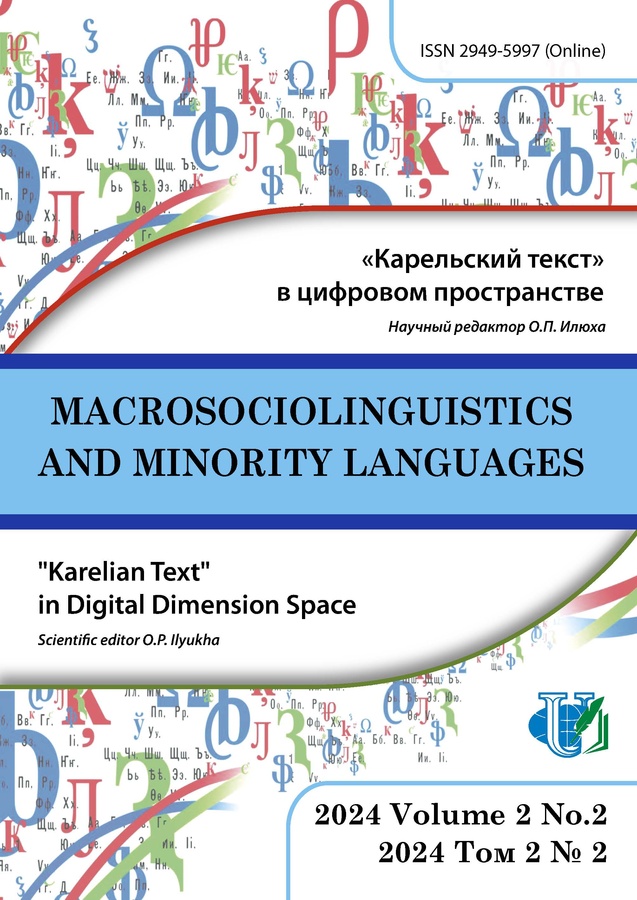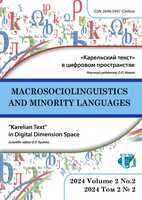Macrosociolinguistics and Minority Languages
Editor-in-Chief: Svetlana A. Moskvicheva, Doctor of Philology, Associate Professor
ISSN: 2949-5997 (online)
Founded in 2023. Publication frequency: twice a year
PUBLISHER: Peoples’ Friendship University of Russia named after Patrice Lumumba (RUDN University)
Open Access: ![]() . APC: no article processing charge
. APC: no article processing charge
Peer-Review: double blind
Publication languages: Russian, Avar, Adyghe, Altaic, English, Bashkir, Buryat, Veps, Dargin, Ingush, Spanish, Italian, Kabardino-Circassian, Kalmyk, Karachay-Balkarian, Karelian, Komi, Crimean Tatar, Kumyk, Lak, Lezgin, Mari, Mordovian, Nenets, German, Ossetian, Tatar, Tuvan, Udmurt, French, Khakass, Chechen, Chuvash, Yakut.
Aims and Scope
Macrosociolinguistics and Minority Languagesis an interdisciplinary peer-reviewed journal of international scope dealing with issues in sociolinguistics and related disciplines. The journal is international due to its editorial board, contributing authors and thematic focus of publications.
FOCUS AREAS
The journal covers highly specialized research topics related to the disciplinary field of macrosociolinguistics, including linguistic law, psycholinguistics, issues of language contacts, language situations, sociolinguistic dynamics, language policy and language planning, social representations of language.
AIMS AND SCOPE
- to promote expert and academic dialogue between Russian and international sociolinguists and specialists in other related areas of study
- to disseminate the latest research in the field of macrosociolinguistics developed both in Russia and abroad
- to publish results of original theoretical, applied and descriptive research within the journal focus areas
- to advance knowledge of various language situations and educate a wide range of readers
DISTINCTIVE FEATURES OF THE JOURNAL
- regular guest-edited thematic issues
- regular section ‘Macrosociolinguistics in Russia and abroad’ dedicated to a survey of major works marking important theoretical and practical advances
- regular section ‘Let’s Talk Science” intended for a general audience of readers
- regular ‘Notes and Discussion’ section where views on important issues related to language preservation, language policy and language
- planning are exchanged
- regular section ‘Call for Young Researches’
In addition to research articles, the journal publishes editorials, book reviews, conference reports and research project announcements. The journal also considers responses and comments on manuscripts published in previous issues.
The Journal is published in accordance with the policies of COPE (Committee on Publication Ethics) http://publicationethics.org.
The editors are open to thematic issue initiatives with guest editors.
Further information regarding notes for contributors, subscription, open access and back volumes is available at: https://macrosociolingusictics.ru/MML/
Current Issue
Vol 2, No 2 (2024): "Karelian Text" in Digital Dimension Space
- Year: 2024
- Articles: 5
- URL: https://macrosociolingusictics.ru/MML/issue/view/1937
- DOI: https://doi.org/10.22363/2949-5997-2024-2-2
Full Issue
"Karelian Text" in Digital Dimension Space
 113-114
113-114


The corpus linguistics and the marathon of recordings of Vepsian and Karelian speech as a tool for popularizing the Baltic-Finnish languages of Karelia
Abstract
The study is dedicated to the prerequisites and results of the Interregional Marathon of Vepsian and Karelian speech recordings “Listening to my native dialect” (January - October 2023). An important component of the policy of preserving the autochthonous languages of the Republic of Karelia is the enrichment with new audio samples of the Baltic-Finnish Speech Corpus developed on the basis of the “Open corpus of Veps and Karelian languages” (VepKar). The speech corpus was developed by the staff of the Institute for the Language of Literature and History and the Institute of Applied Mathematical Research. The corpus includes a collection of spoken texts in different dialects of the Karelian and Vepsian languages, provided with transcription, markup and translation into Russian. The corpus also contains search filters necessary for work (search by language/dialect, place and year of recording, informant and collector, source). Researchers use three main sources to fill the corpus with audio recordings of Karelian and Vepsian speech: audiocollections of the Phonogram Archive of the ILLH KRC RAS, audiorecordings of broadcasts in the Karelian language, as well as field materials of the authors recorded during the expeditions. In order to replenish the corpus map with new audio fragments and ensure a decrease in public interest in the dialects of the Karelian and Vepsian languages was held the “Listening to my native dialect” marathon. Everyone was invited to the latter, who could register both themselves and take part in the role of collectors. The purpose of this study, firstly, is to analyze the results of the marathon as a tool for popularizing and improving the status of the indigenous languages of Karelia, and secondly, as a tool for documenting these languages, which resulted in a collection of recordings of Vepsian and Karelian speech, collected in a linguistic corpus.
 115-130
115-130


Potential of the “Electronic collection of textbooks in the languages of the peoples of Karelia” in the light of the tasks of alphabetism
Abstract
The study provides an overview of the ‟Electronic Collection of Textbooks in the Languages of the Peoples of Karelia” and outlines the possibilities of its use for solving research tasks. The study shows the history of the idea’s inception and the steps taken to create the electronic resource in response to public demand and scientific research needs. The study characterizes the structure and content of the collection, briefly outlines the main stages of the national-language policy in Karelia that influenced the history of regional textbooks; it highlights several authors who made a significant contribution to the creation of school textbooks. The study emphasizes that the creation of the electronic collection aligns with the global trend of converting library collections into digital format, ensuring the preservation of books and expanding their accessibility to readers, as well as promoting the idea in society of treating school textbooks as cultural heritage.
 131-143
131-143


Language policy in the midst of the Civil war and the establishment of the Karelian autonomy based on the documents of the National archives of the Republic of Karelia
Abstract
The study on the basis of documents of the National Archives of the Republic of Karelia considers factors of influence and vectors of language policy in Soviet Karelia of the first half of the 20s of the XX century. The border position of Karelia, the lack of standard forms of Karelian language, significant interdialect differences, uneven level of Russian proficiency in the southern and northern regions of Karelia have created a specific sociolinguistic configuration in the region. The lack of Karelian intelligentsia was also creating additional difficulty in planning language policy measures, making it virtually impossible to organize education in Karelian. The main purpose of the study was to identify the dominant ideologies of language construction on the ground in their interaction with the viewpoint of the central government. The study focuses on the narratives of language policy actors related to the elimination of illiteracy and the language organization of schooling. In this regard, a number of documents from the early to mid-20s period were analyzed, in particular the minutes of meetings of the congresses of county commissioners for public education, the minutes of meetings of commissions for public education at different levels, reports of county, hair and provincial subdivisions of public education, the minutes of the meeting of residents of volosts, etc. The study introduces into scientific circulation previously unpublished archival material on the identified issues, which illustrates the opposing narratives and ideology of language construction in Soviet Karelia, both among representatives of the government in the broad sense of the word, and on the axis of ‟power” - ‟people”.
 144-157
144-157


Karelian language under language shift: assessing language attitudes in Tver region on the basis of a field study
Abstract
The research is of importance because Russian Federation is a multinational state with over 150 minority languages most of which are classified as endangered by UNESCO; thorough examination of the minority languages can be beneficial for it can help develop measures for their maintenance and revival. The participation of the Russian Federation in the program of the International Decade of Indigenous Languages determines as a primary task the monitoring of the viability of minority languages of the Russian Federation, since with its help it is possible to determine specific measures for their preservation and revitalization. In order to identify the contiguity of the parameters of language vitality of the Karelian language in Tver Region, the types of language attitudes are observed. The methodology includes a sociolinguistic interview for collecting data and a statistic method for its processing. The research showed that the Karelian language is the most sustainable among those who were born between late 1930s and early 1960s. 1960s mark the beginning of a gradual language shift towards Russian. Despite the level of language attitudes is rather high, the Karelian language is on the brink of extinction, since the generational transmission is mostly discontinued. The shortage of instrumental writing attitudes also has a negative impact on the state of the Karelian language: the majority of the speakers fail to write or read in Karelian and only master the speaking language.
 158-194
158-194













